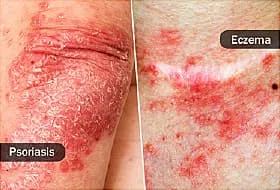Maybe you're settling into your easy chair for a little Sunday siesta. Or you're heading out the door for a day of fun in the sun. Either way, you stop and pause because you've got an itch that just won't leave you alone -- along with blotches of red on your skin. What gives?
Your doctor needs to make the final call, but psoriasis or eczema could be the problem. Both are skin conditions with similar symptoms, but there are ways to tell them apart.
How Psoriasis and Eczema Feel Different
Eczema causes an intense itch. It can get so bad that you scratch enough to make your skin bleed.
Psoriasis could also be itchy, but there's something extra going on. Your skin may sting or burn. Some people say it feels like you're getting bitten by fire ants.
The Differences In Appearance

Psoriasis can also cause red patches. They may be silvery and scaly -- and raised. But if you look closely, the skin is thicker and more inflamed than with eczema.
Where They Show Up
Eczema often appears on parts of your body that bend, like your inner elbow or behind your knees. You can have it on your neck, wrists, and ankles. Babies sometimes get it on their chin, cheeks, scalp, chest, back, arms, and legs.
Psoriasis often shows up on places like your:
- Elbows
- Knees
- Scalp and face
- Lower back
- Palms of your hands
- Soles of your feet
You may also have patches on other areas, such as:
- Fingernails and toenails
- Mouth and lips
- Eyelids
- Ears
- Skin folds
What Triggers Them
Eczema usually results from things that irritate your skin, like:
- Soaps
- Detergents
- Disinfectants
- Juices from produce or meats
Things that cause allergies can also set off eczema, like:
- Dust
- Pets
- Pollen
- Mold
- Dandruff
- Some foods
Infections can start up eczema, and so can stress, sweating, heat, humidity, and changes in your hormones.
Psoriasis shares some of these triggers, like stress and infection. But you can also get flare-ups when your skin is injured, like from:
- Vaccination
- Sunburn
- Scratches
Some medications can also bring on a psoriasis flare, like lithium, which treats bipolar disorder, or drugs for malaria.
At What Age Do They Start?
Eczema usually starts in babies or young children. Often, symptoms improve when a kid becomes a grown-up.
It's less common to get it as an adult. When that happens, it's usually because you have another condition like thyroid disease, hormone changes, or stress.
Psoriasis, on the other hand, usually shows up between ages 15 and 35. But you can get it at other ages too. It's rare for a baby to have it.
Conditions They're Linked To
Eczema usually comes along with dry, sensitive skin. You may have someone in your family who has it or has asthma or hay fever.
Psoriasis is linked to other serious health conditions. If you have it, you may also have diabetes, heart disease, or depression.
Whether it's psoriasis or eczema, your doctor can recommend ways to get relief for it.
How Is Each Treated
Eczema treatment depends on how severe it is. For mild to moderate cases, you’ll use a topical corticosteroid to control inflammation, and you’ll use an emollient on your skin. This type of moisturizer has an oil or cream base, not a water base like lotion, which could dry your skin out more.
Your doctor may prescribe a biologic drug like dupilumab (Dupixent), tralokinumab (Adbry), or the JAK1 inhibitor abrocitinib (Cibinqo). If you have moderate to severe eczema, you may need to try a medicine that affects your immune system like azathioprine, cyclosporine , methotrexate. You might also try light therapy (your doctor will call it phototherapy) using ultraviolet light.
Psoriasis treatment is either systemic, which means it affects your entire body, or topical, which goes on your skin. If your disease is mild, you may be able to control it with topical corticosteroids and emollients.
Light therapy paired with acitretin, apremilast, cyclosporine, deucravacitinib,methotrexate, or a biologic is also an option for more severe cases. Or you could use just a biologic drug, which includes:
- Adalimumab (Humira)
- Brodalumab (Siliq)
- Certolizumab-pegol (Cimzia)
- Deucravacitinib (Sotyktu)
- Etanercept (Enbrel)
- Golimumab (Simponi) and abatacept (Orencia) (for psoriatic arthritis)
- Guselkumab (Tremfya)
- Infliximab (Avsola, Inflectra, Remicade)
- Ixekizumab (Taltz)
- Risankizumab (Skyrizi)
- Secukinumab (Cosentyx)
- Tildrakizumab (Ilumya, Ilumetri)
- Tofacitinib (Xeljanz)
- Ustekinumab (Stelara)

